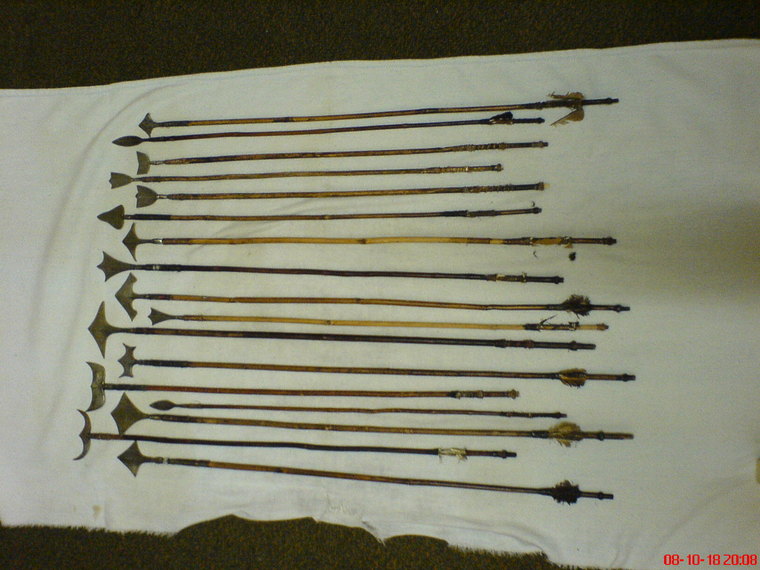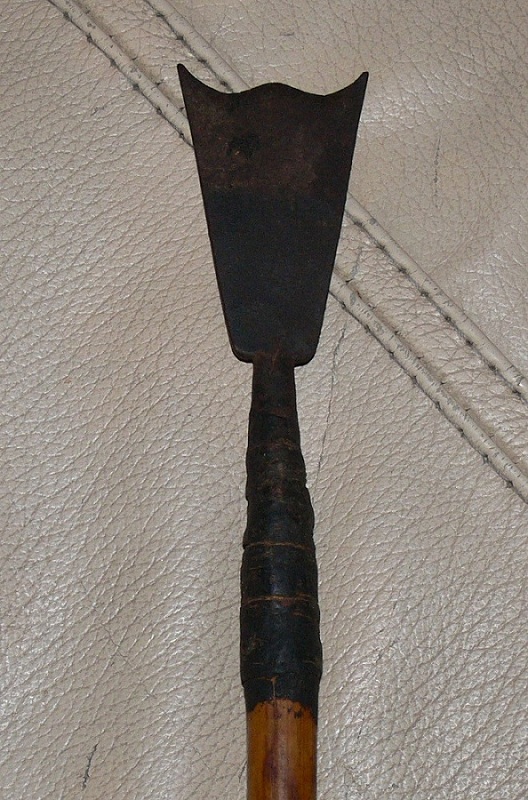Posts: 6
Mon 24 Oct, 2011 8:47 am
Very old medieval Bamboo arrow wide war cutting head
Posts: 289 Location: UK
Mon 24 Oct, 2011 10:09 am
Looks like a fowling head, used for hunting large birds (fowl)
The forward-curving barbs prevent penetration into the bird by getting caught up in the feathers, yet still giving enough impact to kill the bird.
Swept-back, swallow-tail heads, normally associated with hunting! are no good against birds as they slice them open and effectively destroy the innards - not what you want for your Sunday dinner!
Posts: 6
Mon 24 Oct, 2011 10:46 am
How old and what country
Thanks for the info. So if it is a hunting arrow who would have used this type of arrow and what time period. how old and country of origin.
Posts: 614 Location: South Carolina
Mon 24 Oct, 2011 3:25 pm
Re: Very old medieval Bamboo arrow wide war cutting head
| James Monaco wrote: |
Ok the arrow measures 31 1/2" and is at least 150 years old could be much older.
Does anyone know what kind of arrow and head this is. |
I am curious as to how you know it's at least 150 years old? More information about the circumstances surrounding it would probably help (as in where you found it or how you got it, even what country it is in now might help). Why do you think it's medieval (as the title of the thread would indicate?)
I can't really help out in this but it seems to me that more information is needed.
Posts: 6
Mon 24 Oct, 2011 3:57 pm
ok lets just say its for sure over 100 years old easy to see that. I think it might be asian central indians. Does anyone recognize the arrowhead
Posts: 8,310 Location: Montreal,Quebec,Canada
Mon 24 Oct, 2011 4:07 pm
Maybe hunting head , as suggested, but I think I've read before that some heads where wide with the sharpened edge on a wide crescent shape to cut cordage or damage sails when fighting on board ships ?
Posts: 6
Mon 24 Oct, 2011 6:25 pm
I figured out the arrow it is Chokwe
Check the photo looks like the ame feathers and arrowhead. HistoryThe Chokwe were once one of the twelve clans of the great Lunda Empire of 17th- and 18th-century Angola. They eventually became independent when they refused to continue paying tribute to the Lunda emperor. Their successful trading and abundant resources caused them to be one of the wealthiest groups in Angola. By 1900 the Chokwe had dismantled the Lunda kingdom altogether, using guns they had received in trade from the Ovimbundu. Chokwe language and influence then began to dominate northeastern Angola and spread among the Lunda peoples.
 Attachment: 94.89 KB
Attachment: 94.89 KB

Posts: 6
Mon 24 Oct, 2011 6:43 pm
think i see the exact errow in this group and the arrow is for big game and would date from the late 19th century.
 Attachment: 45.51 KB
Attachment: 45.51 KB

Posts: 8,310 Location: Montreal,Quebec,Canada
Tue 25 Oct, 2011 6:10 am
| Glennan Carnie wrote: |
| Jean Thibodeau wrote: | | Maybe hunting head , as suggested, but I think I've read before that some heads where wide with the sharpened edge on a wide crescent shape to cut cordage or damage sails when fighting on board ships ? |
A reenactorism I'm afraid, Jean.
Arrows spin in flight so getting them at exactly the right angle to catch a rope or sail is down to almost pure luck. You can cut a rope, IF the rope is taught (and you catch it just so). Similarly you can cut a sail IF you catch the sail at an extremely shallow angle (almost edge on) with the arrow at the precise angle.
In both cases the chances of causing damage are pretty small. Much better to just use a fire arrow, I think. |
You may very well be correct and what I remember ( But don't remember the exact book I read it in, or if the source was reliable and based on some period documentation ) was about Japanese use of wide Y shaped arrow heads in naval warfare.
At very close range cutting some essential cordage might be theoretically possible, if improbable, and/or with a low chance of success unless the odds would improve if a large quantities of arrows was loosed :?: I do know that the Japanese did use these wide Y shaped heads: Maybe there was another use for them like cutting the silk cords holding Japanese lamellar armour together ? More speculation from me obviously, but they did find them useful for something or they wouldn't have been made. :blush: ;) :D
Probably not too efficient with one arrow but if the armour was subjected to numerous hits in a dense arrow storm the lamelar armour might end up being degraded to a degree.
A variety of other uses mentioned on this site's Forum including cutting bow strings of opponents at close range, straps, cordage etc .... http://www.armchairgeneral.com/forums/showthread.php?t=65027
Called rope cutters, but also for war and hunting and the name " rope cutters: A probable " misnomer ":
http://www.ncjsc.org/gloss_yanone.htm
More debates deflating the rope cutting theory:
http://www.fioredeiliberi.org/phpBB3/viewtopi...mp;t=17553
You
cannot post new topics in this forum
You
cannot reply to topics in this forum
You
cannot edit your posts in this forum
You
cannot delete your posts in this forum
You
cannot vote in polls in this forum
You
cannot attach files in this forum
You
can download files in this forum


